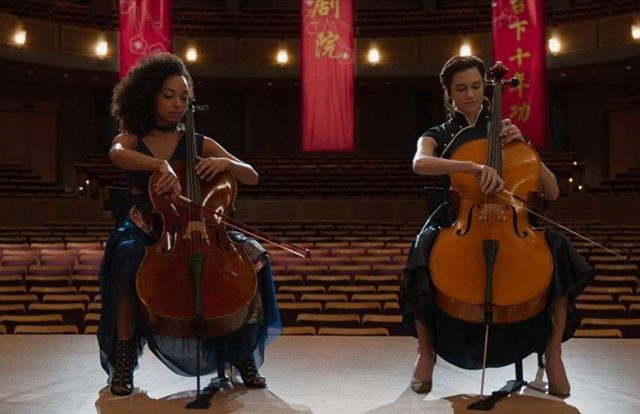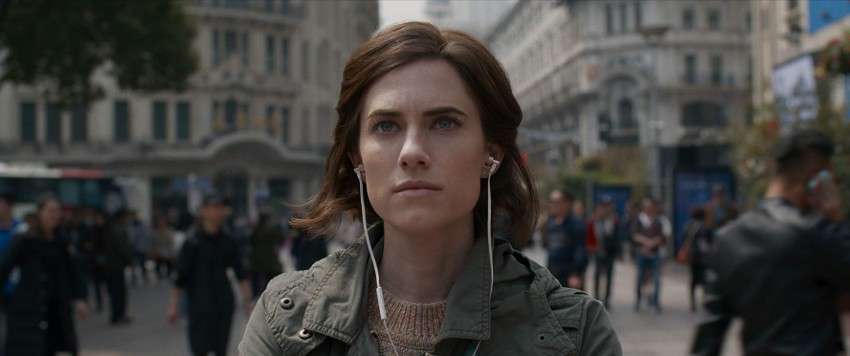
Netflix released one of its many original films on Friday (24 May). The Perfection, a female-led horror film, falls under the LGBTI movies category. The problem is — it’s not actually an LGBTI film, and its imagined feminist edge is, instead, misogynistic and tired.
Directed by Richard Shepard, and co-written by Shepard, Eric C. Charmelo, and Nicole Snyder, The Perfection posits itself as a feminist revenge flick wanting to cash in on the slew of Women’s Marches and angry protest fists.
What it gives audiences, instead, is a wholly predictable, cringey, and dull horror movie with sexist tropes that should have been done away with long ago.
Allison Williams (Get Out) and Logan Browning (Dear White People) star in the film as Charlotte and Lizzie, two renowned cello players from the Bachoff music school.
When the movie begins, audiences learn Charlotte left the school to care for her ailing mother. Upon her mother’s death, she ventures back into the music world, only to realize Bachoff has a new star pupil.
What starts off seemingly as a mix between the rivalry for stardom in Black Swan, and the ruthless music teacher of Whiplash, slowly (agonizingly slowly, stupidly slowly, wastes-everyone’s-time slowly) morphs into a different movie altogether that doesn’t at all earn its twists and turns.

Allison Williams as Charlotte in The Perfection | Photo: IMDB/Netflix
Look online and you’ll see people who have already watched The Perfection recommending others go in blind — this is a terrible, horrible, no good, very bad idea.
Warning: The remainder of this section contains spoilers.
Going in blind for some will mean witnessing content that is possibly triggering and upsetting.
Not knowing a movie or TV show’s thematic content is not worth risking other people’s mental health. Netflix, especially, and should include a content warning for this movie.
Once you’ve sat through the dull and glacial pacing of the first half, the movie’s first twist comes to light. Surprise, surpise, this isn’t a movie about the rivalry between two musicians who will do anything to be on top — it’s a rape-revenge movie.
Rape-revenge movies are a known subgenre of horror. Some better known ones are Revenge, I Spit on Your Grave, and The Last House on the Left. While directors execute some better than others, the question remains about using sexual violence against women as a plot point at all. Whether they should be done away with altogether is a separate discussion, but what remains true is The Perfection is a bad entry.
The Perfection extols damaging tropes like surviving sexual violence making one ‘stronger’ and excusing abuse due to trauma.
In the first half of the movie, Charlotte is not a good person. She uses manipulative techniques like gaslighting to inflict violence and trauma onto Lizzie. Once the twist is revealed, and the writers start performing mental gymnastic to suddenly turn Charlotte into a damaged hero, audiences are left to wonder if rape is an acceptable excuse to wipe away all the bad Charlotte’s done.
By the end, the question lingers: was using rape as a plot point earned or done respectfully? The answer is a resounding no. Gone should be the days of watching a naked, adult male stalk a young girl, threatening sexual violence as punishment.
This is not to say sexual assault and rape are off-limits, but they are themes deserving of much more care, compassion, and prudence than this film offers.

Logan Browning as Lizzie, Allison Williams as Charlotte in The Perfection | Photo: IMDB/Netflix
The Perfection also has sex scenes between Charlotte and Lizzie. This is, apparently, enough for Netflix to classify it as an LGBTI film. These scenes, however, lack an authentic connection between the two characters. Instead, they reek of manipulation and connecting trauma and LGBTI identities.
Lizzie is the first one to initiate the sexual relationship, long before any of the horror comes into play. This makes her intentions likely more genuine — but Charlotte’s reciprocation, in light of the film’s later revelations, is more suspect.
Williams and Browning play the scenes with well-acted affection, giving audiences a glimpse of what could have been a female queer relationship rooted in resilience, power, and a true connection. The rest of the film muddies this and draws a direct line between Charlotte and Lizzie’s shared trauma connecting them. The implication that trauma alone is what led to their sexual relationship and attraction is highly damaging.
Then there’s the fact that this is, simply, a poorly made film.
Its cinematography looks straight out of a student film and shots of grotesque body horror are done solely for shock.
Its script leaves much to be desired. If one goes in with appropriate content warnings, none of the twists are all that shocking. Even with going in blind, once the first major twist comes to light, the rest fall into place miles ahead of time.
The dialogue is perhaps worse, with lines no human being would actually say.
‘I have the bitch,’ says Lizzie emphatically near the end of the film. ‘In the trunk of my fucking car.’
Again: No one would say that.
The film’s script bungles its themes — of sexual assault and queerness, as previously discussed, as well as mental health. Rather than lean into healthy approaches (medication, therapy, etc.), it goes instead for the outdated and visually shocking imagery of electroshock therapy and other damaging practices.
If The Perfection wanted to get across the idea that perfection is pointless and harmful to aim for, then congratulations, it was wildly successful, because this movie is rotten and falling apart from the inside.







